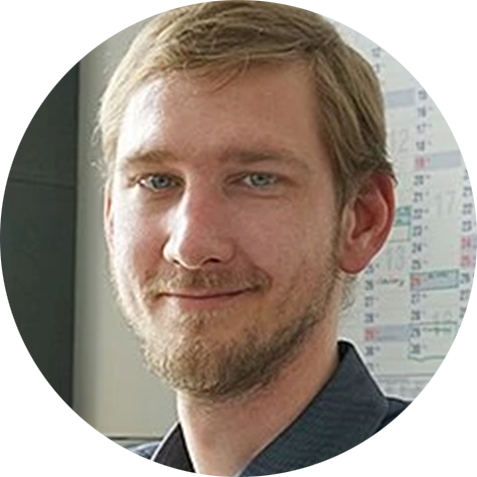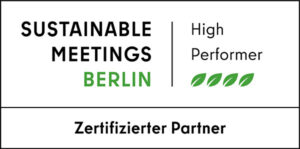Remote interpreting and distance interpreting – rent a PCS interpreter hub

We offer remote interpreting nationwide as a digital – and professional – solution for international conferences.
Here’s how it works: Usually, you find interpreters’ booths at the back of a conference room and the interpreters sitting inside translate the conference proceedings into various languages. Currently, most conferences have been moved to a video format. However, translation services are still needed. To provide a translation of video conferences, interpreters use the interpreting equipment at our premises (so they do not have to travel to a conference venue) and we broadcast (stream) the video conference in the various languages. This means that participants can follow along and actively contribute to the conference in their own language.
To make this possible, we have set up several interpreting studios (interpreter hubs) at all of our premises (PCS Berlin, Munich, Düsseldorf). From these hubs, the interpreters can provide simultaneous interpreting services for your conferences.
[column size=“1-2″ last=“0″]
Our hubs offer professional audio and video streams for up to 32 languages simultaneously. We enable global communication for international participants. Even in these challenging times, important meetings and conferences can be held without any language barriers.
[/column]
[column size=“1-2″ last=“1″]
Our interpreter studio locations Berlin, Düsseldorf, Munich

[/column]
All of this is standard at PCS
[spacer size=“10″]
[column size=“1-2″ last=“0″]
[list icon=“moon-checkmark“ color=“#a62055″]Simultaneous interpreters for up to 32 languages[/list]
[list icon=“moon-checkmark“ color=“#a62055″]Support from engineers and event coordinators[/list]
[list icon=“moon-checkmark“ color=“#a62055″]Unlimited number of viewers[/list]
[list icon=“moon-checkmark“ color=“#a62055″]9 permanent remote interpreter hubs plus additional temporary hubs nationwide[/list]
[list icon=“moon-checkmark“ color=“#a62055″]Virtual meetings/video conferences worldwide[/list]
[/column]
[column size=“1-2″ last=“1″]
[list icon=“moon-checkmark“ color=“#a62055″]European and German servers only[/list]
[list icon=“moon-checkmark“ color=“#a62055″]Password protected and encrypted transmission[/list]
[list icon=“moon-checkmark“ color=“#a62055″]Best audio and video qualityt[/list]
[list icon=“moon-checkmark“ color=“#a62055″]Recordings and live streaming[/list]
[list icon=“moon-checkmark“ color=“#a62055″]Compliance with (future) standard ISO 24019[/list]
[/column]
[spacer size=“30″]
[callout add_button=“no“ button_text=“Learn More“ button_url=“#“ button_color=“#a62055″]Please contact us about customised solutions for more participants, languages or other requirements. We will find a solution for you.[/callout]
[spacer size=“10″]
How does remote interpreting with PCS work for my specific conference?
We will set up a virtual conference for you. Participants can log on from their laptop, desktop computer or mobile device. It goes without saying that the conference will be password-protected and only visible to you and your participants. You can take part in the conference using a dedicated software program which will allow the interpreters to translate what you say. Our engineers and coordinators (hosts) will make sure that your event runs smoothly from start to finish.
You can define active and passive participants for your meeting. Passive participants serve as an audience who can only listen, while active participants are able to ask questions and give presentations.
All participants can speak in their native language and select whichever language they would like to hear. The conference will be transmitted to our interpreter studios, where the interpreters translate simultaneously.
[spacer size=“5″]
How does the PCS remote hub work for me as an interpreter?
[spacer size=“10″]

If you are an interpreter, you can work from one of our interpreting studios in Berlin, Munich, or Düsseldorf. Benefit from highly professional workstations and standard interpreting equipment which meets both the trusted PCS standards and ISO standards. In addition, we ensure that health and safety regulations are met and physical distancing is ensured.
We offer high-quality audio and video transmissions with very little delay. Our hubs are able to broadcast up to 32 languages concurrently. During conferences, one of our engineers is always present and in view of the interpreters, so that any questions or problems can be addressed immediately. Furthermore, a coordinator (host) ensures that the conference runs smoothly and provides support for participants as necessary.
Optional catering is available at all of our sites.
[spacer size=“5″]
Where are the PCS interpreting studios located?
We have fixed remote hubs at our premises in Berlin, Munich and Düsseldorf – in some of the locations we have several studios. Temporary hubs can be set up anywhere in Germany as needed. There is also the option of setting up an interpreting workstation at your company’s premises, ministry or other venue. Temporary and mobile hubs offer flexibility and can be installed quickly.
[spacer size=“5″]
Interpreting from home?
From a technical perspective, we do not recommend that interpreters work from home. Working from home means that you hold the responsibility for a sufficiently fast internet connection and transmission from your home (fail safety, redundancy). The same applies to the liability for data protection and confidentiality! Furthermore, you are not guaranteed protection against acoustic shock which could damage your hearing.
Communication with your team members or an engineer is very difficult or even impossible when interpreting from home.
Organising a multilingual conference is a complex matter which should be left in the hands of professional engineers.
Relying on our hubs means you can concentrate on your actual job: interpreting. Leave the rest to us.
Various terms for remote interpreting
There are a number of terms for interpreting at a location other than where an event is taking place: remote interpreting (RI), distance interpreting, video interpreting, remote simultaneous interpreting (RSI) and more. Don’t let this confuse you. What’s important is that you achieve the goal of your event. Are you looking for simultaneous or consecutive interpreting? For how many languages do you need translation?
[spacer size=“10″]
FAQs: Remote interpreting and interpreter hub/studio
[spacer size=“5″]
[accordion]
[spoiler title=“What is different about my remote interpreting workstation?“ open=“0″ style=“2″]
You interpret from our hubs using our technical equipment – just like in any interpreting booth. Our engineer is present and within view, and will remain available to provide support for the duration of the event.
[/spoiler]
[spoiler title=“How good is the audio quality what is to be interpreted?“ open=“0″ style=“2″]We offer very high-quality audio with minimal delay, as confirmed by many experienced interpreters and customers alike. We orient our technical services on the (nearly complete) ISO PAS 24019 on remote interpreting. [/spoiler]
[spoiler title=“Will there be an engineer on hand?“ open=“0″ style=“2″]During events, one of our engineers is always on-site at the interpreting studio and in view of the interpreters. PCS coordinators also coordinate the technical factors to ensure that your conference runs smoothly.[/spoiler]
[spoiler title=“Where are the PCS hubs located?“ open=“0″ style=“2″]We currently have fixed hubs in Berlin, Munich and Düsseldorf – in some of the locations we have several studios. However, temporary hubs can be set up at any suitable location in Germany.[/spoiler]
[spoiler title=“Is my data secure?“ open=“0″ style=“2″]All of the video conferences and remote interpreting sessions we organise comply with the GDPR (General Data Protection Regulation) and are hosted exclusively on European servers.
Should you have any other questions, please contact us personally or our data protection officer at
datenschutz@konferenztechnik.de
[/spoiler]
[spoiler title=“Is it possible to rent a hub by the hour?“ open=“0″ style=“2″]We do not currently recommend this, as we typically run test calls and final checks prior to the event in order to ensure that everything runs smoothly. You should definitely plan with these services in mind.
[/spoiler]
[spoiler title=“How many participants can the conference accommodate?“ open=“0″ style=“2″]Our current solution allows for up to 10,000 people to take part in a single conference (webinar). We can also stream each conference either with the original audio track or individual interpreter channels for an unlimited number of participants (password protected).
[/spoiler]
[spoiler title=“What are active and passive participants?“ open=“0″ style=“2″]Up to 300 active participants can be selected per conference. Active participants include speakers, hosts or other participants who will be allowed a speaking role in the conference. Passive participants, however, can only listen and watch. Up to 10,000 participants can take part via the chat function. For streams with more participants, we do not provide for any such form of interaction.
[/spoiler]
[spoiler title=“How many languages can be interpreted concurrently?“ open=“0″ style=“2″]
Our systems are equipped to support 32 languages/channels. Should you require more languages, please contact us and we will find a suitable solution.[/spoiler]
[spoiler title=“What standards can I expect from the PCS remote hub?“ open=“0″ style=“2″]
The working conditions in our hubs are highly professional and follow the applicable ISO standards for distance interpreting (ISO 24019) as well as the overall working conditions required by the most prevalent interpreter associations (AIIC, VKD in the BDÜ etc.) for simultaneous interpreters in such studios. These conditions comprise elements such as the interpreting equipment used, sound insulation and acoustics of the speakers’ booths and the rooms, the quality of the audio and video signals, the ability of the interpreters to communicate with each other and the stability of the bandwidth of the internet connection.[/spoiler]
[spoiler title=“Are there any official standards for remote interpreting?“ open=“0″ style=“2″]
Specific ISO standards apply to remote interpreting as is the case for working with on-site interpreting booths. These standards should be observed as a guideline for hub provision. This ensures a professional working atmosphere and the successful execution of an event or conference that meets all expectations.
- ISO 20108 (Audio and video quality)
- ISO 20109 (Interpretation technology)
- ISO 2603 (Stationary interpreting booths)
- ISO 4043 (Transportable interpreter booths)
- ISO PAS 24019 (Simultaneous interpreting delivery platforms)
[/spoiler]
[spoiler title=“I can’t find an answer to my question!“ open=“0″ style=“2″]
Please send us an email with your question to info@konferenztechnik.de. We will either include it in our FAQs or reply directly with an answer.[/spoiler]
[/accordion]





